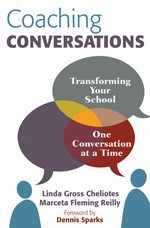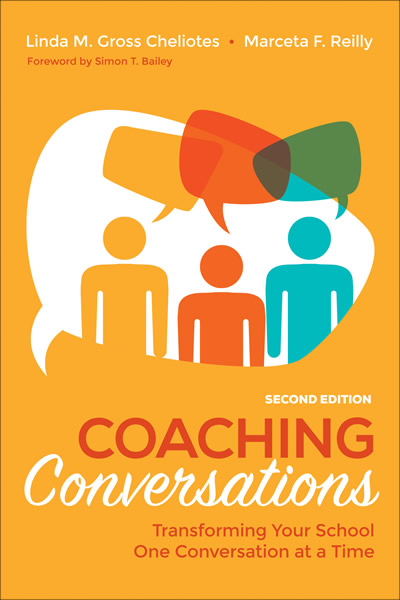Recently, Rebecca Weber, a freelance reporter in South Africa, interviewed me for an article in the newsletter for St. Thomas University online. She asked me what role coaching plays in our schools. Here is my response: Wouldn’t it be great to have a coach for every new teacher and administrator?
Coaching Educators to Enhance Leadership
Posted June 10, 2015 by Rebecca L. Weber
 Marceta Reilly
Marceta Reilly
Marceta Reilly, a leadership coach and co-author of “Coaching Conversations: Transforming Your School One Conversation at a Time” wishes every educator could have a coach for their entire first year in a new role. She believes it could help curb the high attrition rate of
new teachers.
“I think we would lose fewer of them if they had a true coach who isn’t just about fixing problems, but really about self-discovery,” says Reilly, a former principal and superintendent. The delicate and pivotal coaching experience can set teachers up for reflective excellence over the course of a career.
“If you approach coaching as simply helping people do stuff, that’s fine,” says Reilly. “It’s not transformative for their careers. What’s transformative is when as a coach you help people understand their strengths, find their voice, and step into their own personal authenticity.”
Mentors are frequently veterans who give advice based on their own expertise, whereas the coach is more of a guiding role.
“You can be very coach-like in your mentoring,” says Reilly. “Helping them understand best practices in instruction and … using the strengths they bring to the table. It’s very individualized.”
Reilly coaches first-year principals, who often have “huge anxiety” about knowing all the answers to every question their staff might
ask. “They think they have to be chief problem solver,” she says.
When principals let go of the idea of being the expert and having all the answers, it allows them to instead engage, she says. After a teacher explains a challenge, the principal can then ask “What are your ideas?” and can then affirm that the approach makes sense.
“Often teachers come with problems, but actually want validation. Often, you just affirm what they say: ‘Yep, that’s a good approach,’”
she says.
Coaching conversations

Published by Corwin
A coaching conversation is “the major tool for developing leadership skills” and should be about helping somebody else to do their best thinking, says Reilly. Building trust and rapport are paramount. Here are her suggestions for integrating the coach approach:
- Listen deeply. Not just to what they say, but listen for any underlying emotions or assumptions.
- Show up as a thinking partner. This is a mindset: The coach is not an expert trying to fix somebody, but approaches the conversation believing that the other person has the capacity to grow, and the capabilities to solve the problem at hand.
- Ask really good questions to help them reflect and develop insights.
- Give good feedback that moves them to action. “Telling them what they are or are not doing well promotes pushback.”
Culture of self-improvement
When it comes to their students, educators typically see the value in continuous learning and improvement.
But many schools still work in the paradigm that once a teacher has received their training and credentials, they are experts and largely autonomous in their classroom.
A teacher may already have a reflective teaching practice, bolstered by active reading and study groups, as well as occasional workshops for professional development. But they are limited by what they’re conscious of — and that’s where the coach can come in. A good coach
will identify and discuss elements that the teacher is unconscious of.
For those who are in a traditional leadership role, embracing coaching may seem like a threat to authority.
“The biggest challenge is to let go — that you’re not going to be considered credible if you don’t have the answers,” Reilly says. “Like Brené Brown, you have to make yourself a little vulnerable.”
The coach approach
 Jim Knight
Jim Knight
Instructional coaches work in partnership with teachers, helping them set and reach their own goals. Good coaching is adaptive to meet the changing needs of the complexities of teaching in the modern classroom.
“We modify things until we hit the goal,” says Jim Knight, director of the Kansas Coaching Project and author of “Instructional Coaching:
A Partnership Approach to Improving Instruction.”
When working with teachers, Knight’s team emphasizes two important principles:
- Try to respect the autonomy of the teacher. “When you insist, they resist,” says Knight.
- Believe in the coaching process. “This has an unmistakably positive impact on kids’ lives,” he says.
Getting on the same page
Knight favors peer-to-peer coaching relationships. “They’re more forthcoming with peers than with administrators,” he says. The ideal scenario is one of transparency and safety. If that’s not the culture, then concerns about privacy and what will be shared arise.
“When you’re a coach, you’re privy to people with their guard down.”
That doesn’t mean that principals can’t model coaching as well — in fact, when they’re on the same page, they can lead change in
incredibly effective ways. “A principal needs to walk the talk,” says Knight.
For example, if the principal wants teachers to videotape their classes, then the principal needs to model this and also record and
review his or her own video, and discuss what s/he learned.
Make the process transparent
Transparency can make the process less intimidating and help educator relationships move forward.
“Teach them what you want: ‘If you have a problem, first I’m going to ask you what you’d do. If you have something I want you to think about, I’ll be honest and tell you.’ It’s scary to do that. You feel like you’re taking a big risk,” Reilly says.
Modeling for staff what it means to try something new underscores authentic commitment. “It’s counterintuitive, but they begin to think
you are the smartest person in the world — even though you are just pointing them to resources.”
Rebecca L. Weber is a journalist who covers education, the arts, the environment, and more for the New York Times, CNN, USA Today, and other publications. Visit her online at www.rebeccalweber.com or on Twitter @rebeccalweber.









Comments on this entry are closed.